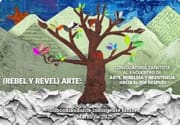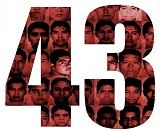After 17 (The Miliciana Ixchel-Ramona Division)
Source: Enlace Zapatista
After 17
(The Miliciana Ixchel-Ramona Division)
September 2021
La Extemporánea [1] includes a division of milicianas [female members of the Zapatista civilian militia or reserves]. Apart from being one of the “Listen and Share our Word” groups, they will be in charge of security during the flight and will play one or more soccer matches with women’s teams on the European continent.
One hundred ninety-six milicianas signed up to travel. About twenty were less than 18 years old, so they prepared for the later journeys to the continents of Asia, Oceania, Africa, and America, expecting to be of age by then and able to obtain a passport.
The difficulties with getting their papers (they’re all extemporaneous) and the never-ending runaround at the whim of the government “officials” forced many to abandon the effort. Some are single mothers who have to work to provide for their children. The majority work to support their mothers and younger siblings. Training was also a problem, because it turns out it wasn’t a walk in the park, but rather required preparation for “Listen and Share our Word” work. What was most difficult for them was learning to listen.
Thirty-seven remained. Plus two minors: Defensa (15 years old) and Esperanza (12). So in all there are 39 milicianas. They have been quartered at the Seedbed for three months, practicing, learning, rehearsing, and waiting for the chance to travel: a place to arrive to in Europe. All are of Mayan origin and speak Tzeltal, Tzotzil, Cho´ol, Tojolabal and Castilla [Spanish]. A few are over 25; the majority are between 18 and 21. Their soccer skills are a State secret, but their willingness to struggle is obvious.
No adult male could enter their barracks without permission. If some lost dude entered, he was immediately surrounded by a group of milicianas and “encouraged” to leave at once with solid arguments from batons and slingshots.
The first days of their preparation and adaptation were difficult. The days to follow were even harder. Far from their families, partners, and familiar foods of their villages, they had to endure uncertainty, hunger, sickness, a new climate, the confusion of living with others who are different, the surprise of learning new things, and the astonishment of seeing they could do things they didn’t know they could. For example: listening. And pardon me for insisting again and again about listening, but I look outside and hear the whole world trying to talk – or rather, shout – and find no one, or almost no one, with the willingness to listen.
These combatant compañeras have left behind their first 17 years of life, whether they marked that year on their calendar recently or long ago. There is no doubting their identity: they are ZAPATISTAS.
-*-
As It Turns Out, No
A miliciana speaks during the General Assembly of the Extemporánea, during the evaluation of what was and was not achieved during the “Listen and Share our Word” preparatory course:
“I didn’t know about anything that you all have described. I thought that it had always been this way, that I could go to school, have a boyfriend without the obligation to get married, that I could get married if I wanted or not get married if I didn’t, that I could dress how I wanted, that I could participate, learn and teach. I thought it had always been like it is now, where we have rights and not just responsibilities. But now I’ve heard what the compañera said about what life was like in the time of the finqueros [plantation owners]. I heard what it took to prepare to struggle. I heard what it took to go to war. I heard how autonomy was built. So I think I have to get ready to defend what we have built so that those times never return. I thought that’s just how it was, that women were born into freedom. But it turns out that, no, they had to fight, they have to keep fighting. So there’s no rest.”
-*-
In Defense of 17 Years
I’m not sure, but I think it was 2018.
It was decided that the milicianas would be in charge of security for the First Gathering of Women Who Struggle. They were summoned to practice. They didn’t march together as one. Their steps were as different as the languages of their origin and destiny, coming out disorganized and arrhythmic. They went on practicing, but it didn’t get any better. Desperate, I decided that maybe some musical rhythm would align their steps. The tercias [Zapatista media team members] were testing their sound equipment, and I asked if they had any music. “Only cumbias and reggaeton,” they responded. I insisted, “Something else, not that,” and they laughed, saying, “That’s all we’ve got.” I asked the milicianas if one of them had a song I could use on their cellphones. Sly laughs and whispers. They dallied. Finally one said, “Just cumbias.” “Ok,” I said, giving up, “So what cumbias do you have? And don’t say the Moño Colorado or else you’ll die a terrible death.” More laughs and whispers in four distinct Mayan languages. After a while: “Just one, 17 Years.” “You each have just one cumbia and they’re all the same?” “Yes, 17 Years.” “Ok, well that’s the one then. Send it to the tercias and have them put it on the big speaker. And get in formation to start practicing again.”
The first chords rang out, they raised and crossed their staffs, and voilà, they started marching all together, all in step. Later I asked if it was true that everyone only had that one cumbia. “Yes,” they said, “and when we have cell service or other compañeras come we’ll have more, like Cómo te voy a olvidar.”
Later I asked for a list of milicianas and their ages, organized by caracol, to group them by language and age. The great majority were between 15 and 17 years old.
Now they’re between 18 and 21, and whether or not they have a boyfriend (they’re not worried either way), no one forces them to marry, they fall in and out of love, they break hearts and get theirs broken. They know no one can force them to do anything they don’t want to do, and they know how to defend themselves. They’ve learned about men’s vulnerable areas, in case they need to physically defend themselves. And they know what words hurt men too, in case psychological defense is needed. Don’t ask me who taught them these male “secrets.”
When asked if they had a boyfriend, most said yes. One said “cheb” (“two” in her language). The one beside her said something under her breath, then corrected herself: “No, ocheb” (“three” in her language). Another said “bayal” (“lots”). Another was slow to respond because she said she’d lost count. They all laughed heartily.
In summary: They were 17 and at that age, that cumbia – by “Los Ángeles Azules” I believe – followed them through love and heartbreak. Those who criticize the cumbia or want it banned probably forget what it was like to be 17. Maybe they forget that, yes, relationships at any age can be those of a heartless predator and their prisoner, but they can also be those of restlessness and the freedom to fall in and out of love. It’s the discovery that your heart can be both a bittersweet flower and a wound that doesn’t heal. Plus, you’d also have to ban Violeta Parra’s “Volver a los 17.” [2]
Now that they’re no longer 17, perhaps the milicianas will dedicate “Cómo te voy a olvidar” [How can I forget you?] to their past or present loves.
-*-
No More Penelopes
I asked them what they’d told their boyfriends. They said, “If he really loves me and isn’t lying about it, he’ll wait for me. And if not, oh well, I’ll find another.” So none of this business of knitting and re-knitting an eternal tapestry of waiting in vain. It’s one more sign that the tables have turned.
-*-
Consent
The compañeras are taught that no one can touch them without their explicit consent. Not to hold their hand or put a hand on their shoulder, nothing. They’ve been instructed on how to remove a male hand from the shoulder, regardless of whether or not it belongs to a commander. The same goes for their image: no one can take photos or videos of them without their consent, much less publish them. They were shown the video at the end of this text and asked in meetings organized by caracol and language whether or not it could be published. After discussing they agreed unanimously that it could be published. You’re hereby advised.
-*-
To each their own
As for me, I’ve been living a lie since 2018. I thought that the chorus of the cumbia “17 Years” said “Love is so sad, love is so sad” [que triste es el amor]. The sergeants corrected my mistake, saying “That’s not it, Sup. It says ‘if that’s what love is’ [que si eso es el amor], meaning the young woman doesn’t know yet, that she’s just learning.” They laughed.
Practicing marching to the sound of “La Carencia de los Panteones,” “El Lago de los Cisnes,” and “La Cumbia del Sapito” showed that dance, like life, can scale the most insurmountable walls.
You might even say that cumbias are like soccer jerseys: with scissors, needle, and thread you can adjust them to fit however you wish, tight or baggy.
In conclusion, to each their own: to each their own cumbia, their own pas de chat [3] (or their own cat-dog leap), their own ska. Hit the floor, raza!
I bear witness.
SupGaleano, practicing his “Chúntaro Style.” [4]
(Well everybody ‘s gotta cut a rug as best they can)
Mexico, September of the year 501
Music: ALADEMOSKA – «Sembraremos Rebeldía»/ Bersuit Vergarabat – «El Baile de la Gambeta»
[1] Zapatista Airborne Company; see the EZLN’s August 17, 2021 communique for an explanation of the use of “La Extemporánea” [the extemporaneous]: https://enlacezapatista.ezln.org.mx/2021/08/17/only-500-years-later/
[2] Violeta Parra is one of Chile’s most famous folk musicians, and her song “Volver a los 17” was released in 1966 and later banned under the Pinochet dictatorship.
[3] Pas de chat is a type of ballet leap, literally “the cat’s step” in French.
[4] Chúntaro refers to poor or indigenous Mexicans and can mean lowbrow or “tacky” or can be a racial insult akin to “injun.” “Chúntaro Style” is a song by Monterrey cumbia band El Gran Silencio and is associated with a characteristic cumbia dance seen here: https://www.youtube.com/watch?v=DzFXEtTjjTE












